Reviews of Electric Construction Equipment By Early Adopters
As more and more companies consider electric construction equipment to supplement their existing fleet, several contractors have expressed hesitancy — and for good reason. For one thing, emobility is new […]
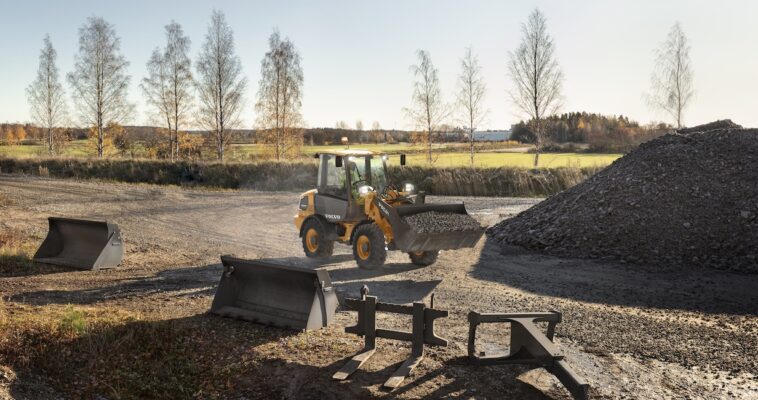
As more and more companies consider electric construction equipment to supplement their existing fleet, several contractors have expressed hesitancy — and for good reason. For one thing, emobility is new to the construction industry. Also, while electric makes sense for many now, there are a lot of considerations to think about first before making an investment. Things like an adequate charging infrastructure and how and where electric machines will be used are important to figure out upfront.
That said, some contractors out there have been eager to jump on the electromobility train, working hard to secure machines to try them out and better understand exactly how electric construction equipment will play a role in their evolving businesses.
These early adopters have found success running electric construction equipment — specifically, the Volvo ECR25 Electric excavator and L25 Electric wheel loader.
Baltic Sands Inc. – Property Development
Jacques Marais is the director at Baltic Sands, Inc. out of Yucca Valley, California. His company specializes in environmentally sensitive, luxury off-grid property development and real estate. He’s been working with machines all his life — and electric has always been on his mind.
“I’ve always been curious and quite anxious to see where this is going and how we can apply electromobility to our business,” he says. “I can’t emphasize enough how excited we are to be in this position right now. I just have a sincere belief that this is the future.”
Jacques and his crew have piloted the two Volvo electric machines in Southern California and it’s his hope that this is just the beginning.
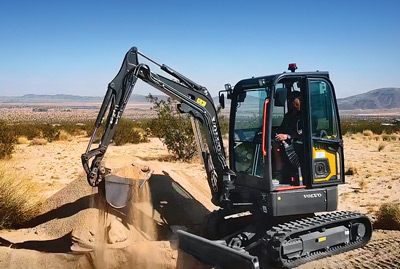
“For Baltic Sands, this is where ideology meets reality,” he says. “Right now, we’re seriously pursuing the idea of how we integrate these units into a business that delivers the type of work that we do and has traditionally depended on diesel-powered equipment. Our ambition is to be one of the first to try it out.”
So what advice does Jacques have for contractors out there who may be a little skeptical of electric construction equipment?
“Investigate what your operation is — really scrutinize what your existing units are doing on an average type of job,” he says. “It’s important to examine how many hours ‘x’ unit is being used to know the amount of time it’s under full utility during an eight-hour work cycle. That will determine whether or not electric machines can be well integrated into your fleet, without having a negative effect on your total productivity or total timeframe for your budgets.”
Read more about how Baltic Sands Inc. is using Volvo compact electric equipment for site development in Southern California.
Toronto Zoo – Animal Care
In the interest of animal comfort and further development of environmentally friendly operations, the Toronto Zoo, through Volvo dealer Strongco, tested the effectiveness of the Volvo ECR25 Electric excavator and L25 Electric wheel loader for use within animal enclosures and public areas.
To see how the machines impacted nearby animals, workers separated the bison, as they normally would, in order to add new features to the habitat and perform maintenance.
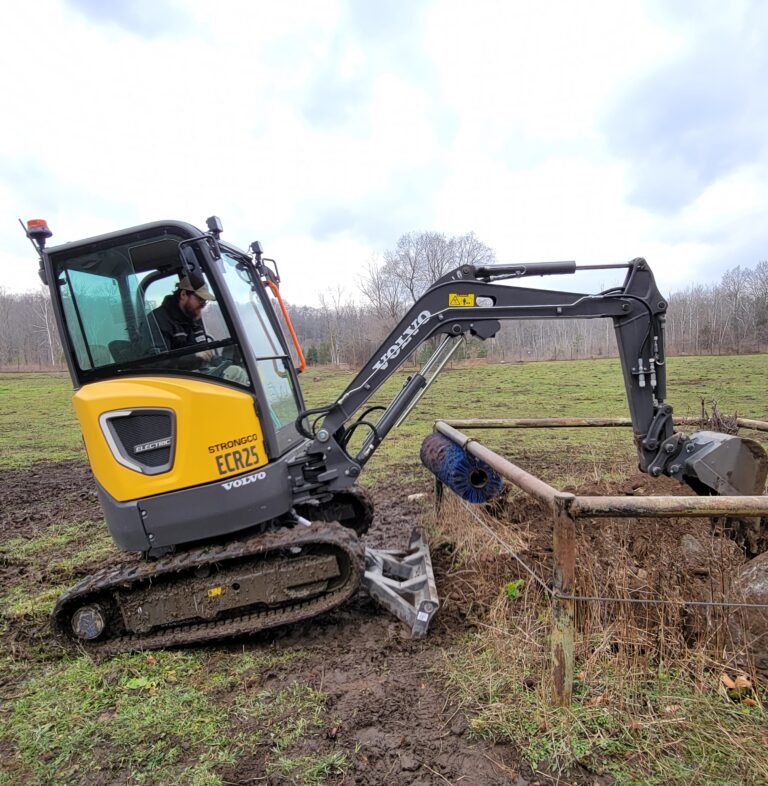
According to zoo employees, when operating heavy equipment in a zoo, the most important thing is to be aware of is the comfortability of the animals and, in this particular case, it’s typical for the bison to begin crying out with impatience after an hour of loud combustion engine operation. However, after three hours of working with the electric equipment, the bison remained quiet, showing no signs of agitation.
“We can be working in here and there’s no loud noise right now. The animals are still quiet in their exhibit or holding pen,” explained Neil Grant, Horticultural Lead Hand at the Toronto Zoo.
Management and employees were happy with the results of the pilot project and expressed interest in adding some of Volvo’s electric equipment to their fleet in the future.
Outside of animal safety and comfortability, Chris Theodoridis, Transit and Fleet Mechanic at the Toronto Zoo, explained the reasoning for his interest in the machines: “The main reason is that they’re environmentally conscious. Also, [lower] maintenance costs and ease of serviceability. It’s the direction of the future, so we’re trying to get it done with the entire fleet.”
Vandalia Rental – Equipment Rental Companies
While electric machines aren’t new to most rental companies, certain types of electric heavy equipment are. And for Vandalia Rental in Western Ohio and Northern Kentucky, that included electric compact excavators — until now.
With two new Volvo ECR25 Electric excavators on the way, Vandalia will soon be able to rent them out to companies already eager to put them to work.
“It’s important for us to get in early with certain types of rental equipment — especially if we think it can grow momentum,” says Adam Virag, Director of Operations. “We were one of the first to rent electric boom lifts, buggies and so on. We’re already seeing a need for electric excavators indoors, so these Volvo machines are a perfect fit.”
Current requests are coming from manufacturing plants in the area looking to make indoor modifications where a machine must get in and perform demolition work with zero emissions. The electric excavators will be paired up with other electric machines like electric buggies to haul out concrete and debris — and all of this can be done while factory workers are present. In the past, most of this work was done by hand over a longer period of time.
“The primary benefit with electric construction equipment is that the employees in the plant can still function throughout the day and get their work done,” Virag says. “Typically, this type of work would have to be done after the third shift or on a weekend. But with low noise and no emissions, it can now be done during the week.”
Once the electric compact excavators start renting, Vandaila Rental anticipates even more requests for the types of work electric machines can perform. Virag says electric compact wheel loaders are likely the next machines they’ll consider adding to their expanding fleet.
“There really isn’t a whole lot that can go wrong with electric machines. There are hardly any maintenance issues, plus the charge seems good for the types of jobs they get done,” he says. “We don’t hear complaints about that on our current units, and I’m certain it’s going to be the same with the Volvo units once they’re here.”
Casper Company – Indoor Demolition
Casper Company, a family-owned business near San Diego, is a leading provider for Southern California’s concrete cutting, demolition and hazardous materials abatement needs.
For demolition specifically, Casper tried out the Volvo ECR25 Electric excavator for indoor projects. The machine performed demolition tasks, some concrete cutting work and helped complete additional environmental service projects.
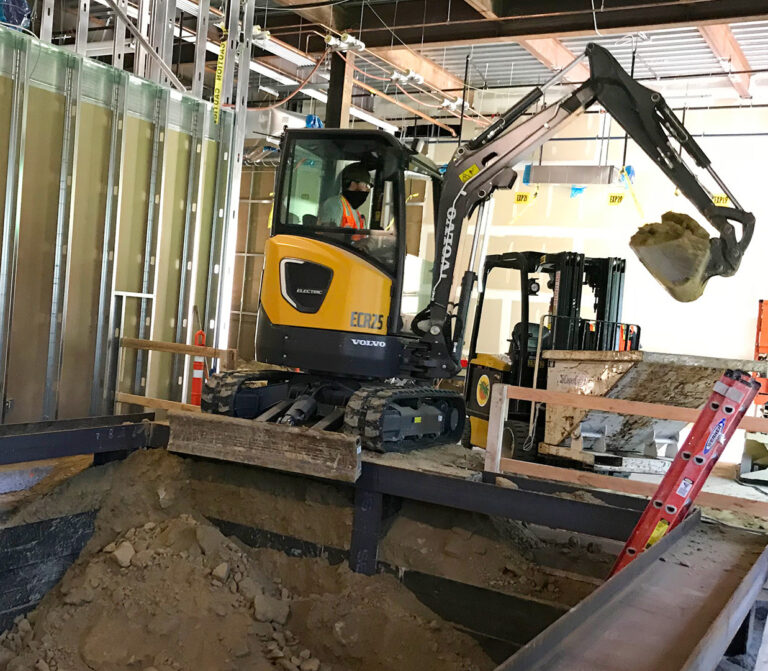
“We do a lot of underground utilities in the existing buildings that are occupied,” says Darrell Merritt, a foreman with Casper. “The biggest problem we have is noise and exhaust fumes. For a lot of our jobs, we had to do it by hand because we had no access to fully electric machines. We needed something we could actually use in lieu of added manpower.”
After putting the ECR25 Electric to work, Darrell said his operators loved it.
“With this machine, operators and anyone around them can talk to each other. Typically on our jobs, diesel-powered machines mean you’re constantly waving your arms trying to get the operator’s attention. With electric, you can make eye contact and communicate much easier. It helps with site safety, but our operators also aren’t as tired at the end of the day.”
Does Casper see electric heavy equipment as an advantage to attract operators over diesel machines?
“I do,” he says. “A lot of our younger operators were raising their hands to jump on board right away. They loved how easy it was to run, and especially the low noise.”
For charging, Casper experienced five to six hours of runtime with a breaker. Their best method of charging was the battery pack, which was brought out to the jobs so charging could happen on site versus bringing them into the yard each night.
And from a business perspective, Casper sees a future for electric machines in their fleet.
“Our goal was to get a jump on our competitors,” he says. “With demolition, we do everything from tearing complete buildings down to small sidewalk panels to underground utilities. Sometimes when we pull up on a job, we get a bad rap for being loud because we’re demo guys. When we pull up with electric machines that are quiet and green, it gives us a leg up, plus our general contractors are excited about it too.”
Walden Hill – Farming
Since its founding in 2014, Walden Hill has focused on putting nature, animals and people first through sustainable forestry and other environmentally friendly practices on their 400-acre farm in Massachusetts.
Now, they have a machine to support their philosophy. Walden Hill, which placed the first North American order for a Volvo ECR25 Electric compact excavator, received the new fully electric, zero-emission machine in mid-July 2022.
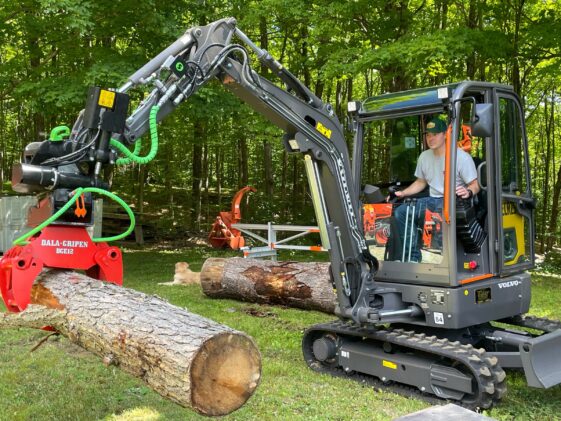
“Minimizing our carbon footprint is critical, so we try to do that with every decision we make,” says Jennifer Milikowsky, co-owner of Walden Hill. “We did a deep energy retrofit on the 1820 farmhouse that we live in, we’re exploring a solar installation on the farm, and now we get to take a big step forward in trying to convert our fleet of vehicles and machines to electric.”
Milikowsky and her husband, Tylan Calcagni, produce maple syrup and harvest acorns used to feed pigs at nearby farms. Their love and respect for nature led them on a sustainability mission. They said the thought of buying a diesel machine in 2022 that they would use for a decade or more was hard to accept, and the opportunity to get a machine that could get the job done while running on renewable energy was important to them.
“Anyone who owns or works on a small family farm knows that the daily list of jobs is as diverse as it is long,” Calcagni says. “This excavator might help us put in a culvert under a forest trail one day and help us do site prep for a new sugar house the next. We’re so excited to have this versatile machine at our disposal.”
Previously, the couple would either rent an excavator or try to figure out how to use their tractor to get tasks done. They realized it’s much better to have the machine fit for the job, allowing them to cut significant hours on various jobs. Other perks of their ECR25 Electric include simple maintenance, much quieter operation and zero emissions — especially important when working near so many plants and animals.
“For technology to become mainstream, you need early adopters who demonstrate interest and provide feedback on it,” said Milikowsky. “We’re thrilled to be those early adopters for the electric excavator, and we hope it’s just the beginning of a bigger transformation in the industry.”
Categories: Construction Equipment, Electric Equipment


